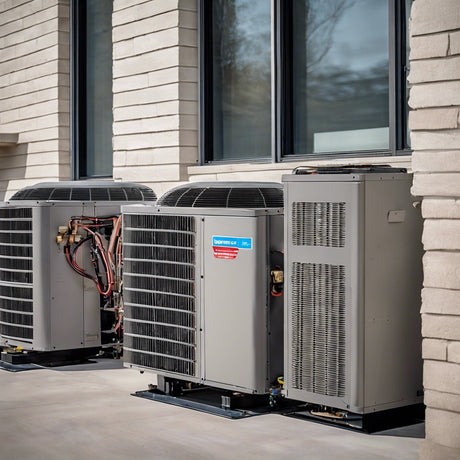- No products in the cart.
Weatherproofing Your Home: HVAC Installation for All Seasons
17
Feb
Introduction: As homeowners, we strive to create comfortable living spaces that withstand the challenges of changing seasons. A crucial aspect of achieving year-round comfort is investing in a robust HVAC (Heating, Ventilation, and Air Conditioning) system that can efficiently adapt to varying weather conditions. In this article, we'll explore the importance of weatherproofing your home through strategic HVAC installation for all seasons.
Understanding Seasonal HVAC Needs: Each season presents unique HVAC requirements, from keeping warm in winter to staying cool in summer and maintaining indoor air quality year-round. By understanding these seasonal needs, homeowners can make informed decisions when selecting HVAC equipment and optimizing system performance.
Winter HVAC Considerations: In winter, the primary goal of HVAC systems is to provide effective heating while minimizing energy consumption and heat loss. Key considerations for winter HVAC installation include:
- Efficient Heating Solutions: Invest in high-efficiency heating systems such as furnaces, heat pumps, or boilers that can effectively warm your home while reducing energy costs.
- Proper Insulation: Ensure adequate insulation in walls, ceilings, and attics to prevent heat loss and maintain consistent indoor temperatures.
- Sealing Air Leaks: Seal gaps and cracks around doors, windows, and ductwork to prevent cold air infiltration and improve energy efficiency.
- Programmable Thermostats: Install programmable or smart thermostats to regulate temperature settings and optimize heating schedules based on occupancy patterns and preferences.
Summer HVAC Considerations: In summer, the focus shifts to cooling and dehumidification to maintain a comfortable indoor environment. Important considerations for summer HVAC installation include:
- Energy-Efficient Cooling Systems: Choose energy-efficient air conditioning units or heat pumps with high Seasonal Energy Efficiency Ratio (SEER) ratings to minimize electricity consumption and reduce cooling costs.
- Proper Ventilation: Ensure adequate ventilation through the use of exhaust fans, attic vents, and whole-house ventilation systems to remove excess heat and humidity from indoor spaces.
- Shading and Insulation: Install window treatments, awnings, or shade trees to block direct sunlight and reduce solar heat gain. Additionally, add insulation to walls and roofs to minimize heat transfer from the outdoors.
- Air Quality Control: Consider installing air purifiers or filtration systems to remove allergens, pollutants, and airborne particles from indoor air, improving overall air quality and comfort.
Year-Round HVAC Maintenance Tips: Regardless of the season, regular maintenance is essential to ensure optimal performance and longevity of your HVAC system. Here are some year-round maintenance tips to keep your HVAC system running smoothly:
- Change Air Filters: Replace air filters regularly to improve airflow, reduce strain on the system, and maintain indoor air quality.
- Clean Air Ducts: Schedule professional duct cleaning to remove accumulated dust, debris, and contaminants from ductwork, improving system efficiency and air circulation.
- Check Refrigerant Levels: Have a licensed technician inspect and recharge refrigerant levels in air conditioning systems to ensure proper cooling performance.
- Schedule Tune-Ups: Schedule annual HVAC inspections and tune-ups to identify and address potential issues before they escalate into costly repairs or system failures.
Conclusion: Weatherproofing your home through strategic HVAC installation is essential for maintaining comfort, energy efficiency, and indoor air quality throughout the year. By understanding seasonal HVAC needs, investing in energy-efficient equipment, and practicing regular maintenance, homeowners can create a comfortable and resilient living environment that withstands the challenges of changing seasons.













